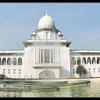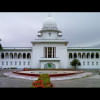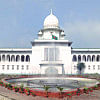Lower Court: Govt finalises disciplinary rules for judges
The law ministry has finalised the disciplinary rules for lower court judges in line with article 116 of the constitution, which allows the president to control their postings, promotions and leaves in consultation with the Supreme Court.
Article 116, in its current form, says, “The control (including the power of posting, promotion and grant of leave) and discipline of persons employed in the judicial service and magistrates exercising judicial functions shall vest in the President and shall be exercised by him in consultation with the Supreme Court.”
The rules would be sent to the president today through the prime minister for approval, a law ministry high official requesting anonymity told The Daily Star yesterday.
If President Abdul Hamid approves the rules, the law ministry would issue a gazette notification to this effect, he said, adding that the disciplinary rules were prepared with SC and the government's consensus.
The Supreme Court recently went through the draft and sent it back to the ministry with its opinions.
The official refused to disclose further details on the rules.
On November 16, Law Minister Anisul Huq met five judges of the Appellate Division of the SC and discussed the rules and then told The Daily Star that the problem regarding issuance of a gazette notification determining the discipline of lower court judges had been solved.
The gazette notification might be issued by December 3, the date scheduled for the next hearing of the Masdar Hossain case, known as the judiciary separation case, at the Supreme Court, he said.
On November 5, Attorney General Mahbubey Alam told reporters that [the then] chief Justice Surendra Kumar Sinha wanted to see that the rules curb the power of the president. The government, therefore, was trying to resolve the issue through discussions with the SC and the law ministry, he added.
While presiding over the Appellate Division bench, Justice Sinha had expressed annoyance and dissatisfaction several times at the government's failure to issue a gazette notification on the rules.
Article 116 of the original charter of 1972 had empowered the SC to decide on the posting, promotion and leave of lower court judges. The top court had also control over the magistrates' exercise of judicial powers and could discipline the judicial service staffers when necessary.
Over the years, this article has been amended several times, curtailing the apex court's powers.
Currently, the powers to control and discipline subordinate courts are vested in the president, who exercises these powers in consultation with the SC.
However, according to article 48 (3) of the constitution, the president acts on the advice of the prime minister. This gives the government ample scope to exercise power over the judiciary.
In a message on October 31 last year, Justice Sinha had said such a "dual rule" was hampering the judicial work and was also increasing justice-seekers' sufferings.
"The Supreme Court alone cannot take steps regarding lower court judges' promotion and transfer or any disciplinary actions against them due to the [present] article 116. Judges cannot be appointed to fill many vacant posts at district courts on time due to the dual rule," he said in the message issued on the occasion of the ninth anniversary of the separation of the judiciary from the executive.
The lower judiciary was separated from the executive branch on November 1, 2007, following the Supreme Court directives in the Masdar Hossain case.

 For all latest news, follow The Daily Star's Google News channel.
For all latest news, follow The Daily Star's Google News channel. 






Comments